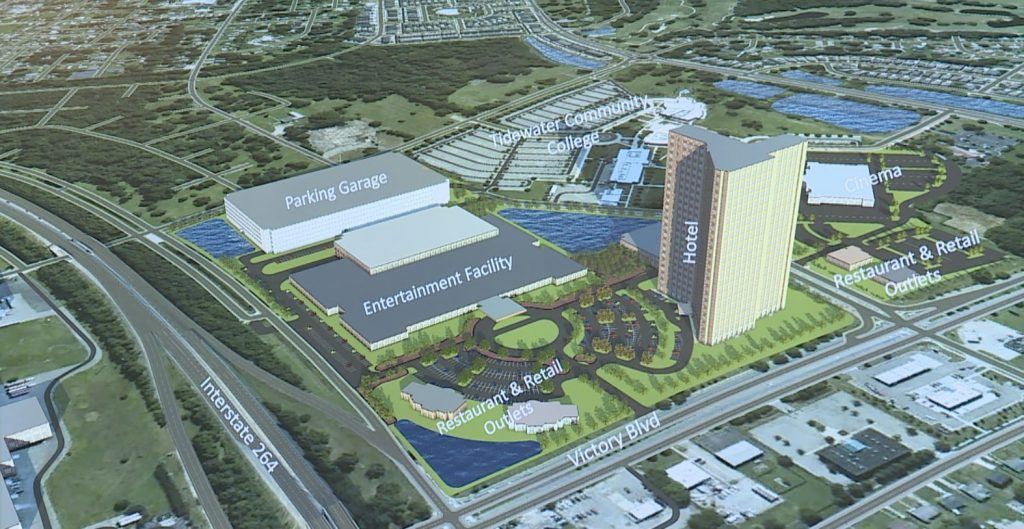Virginia lawmakers will hash out the differences they have with a bill that would legalize casino gaming in their state by creating a conference committee.

Rendering of the proposed casino Rush Street Gaming would operate in Portsmouth, Va. (Image: WAVY-TV)
The committee will be needed after the 40-member state Senate voted unanimously to reject the House substitute of Senate Bill 36. It’s uncertain when the conference committee would first meet.
We have some technical amendments that need to be worked out,” state Sen. Louise Lucas (D-Portsmouth) said on the Senate floor Tuesday.
The major issue between the two chambers appears to be tax-related.
The Senate bill calls for a casino’s annual adjusted gross revenue (AGR) to be taxed at 27 percent for the first $150 million. Any revenue between $150 million and $300 million would be taxed at 31 percent, and any revenue above $300 million would be assessed a 40 percent levy.
The House of Delegates, which substituted a House version of the casino bill when they approved the measure on Friday, divides casinos into two categories.
For casinos representing an investment between $250 million and $350 million, the first $150 million in annual AGR would be assessed a 15 percent tax. AGR between $150 million and $300 million would be taxed at 20 percent, with any AGR exceeding $300 million facing a tax of 28 percent.
For casinos with an investment of more than $350 million, the first $200 million would be taxed at 15 percent, the next $200 million would be taxed at 20 percent, and anything beyond $400 million would be taxed at 28 percent.
Some Groundwork Underway
The legislation would allow five cities to build casinos: Richmond, Bristol, Danville, Portsmouth, and Norfolk.
Local referendums are required before any of the cities can move forward with licensing a casino in their community.
But already, casino groups are organizing in an attempt to get the support of local officials. The Pamunkey Indian Tribe is pursuing casinos in Norfolk and Richmond. Both Hard Rock International and the Eastern Band of Cherokee Indians are vying for the Bristol license, while Rush Street Gaming is considering Portsmouth.
Danville sought proposals from casino operators in a solicitation that closed on Jan. 13.
Time Running Out
This is the second year in a row that the Virginia legislature has considered casino legislation.
Lawmakers approved casino gaming last year. However, that bill included a re-enactment provision, which essentially meant it needed approval this year as well. The move gave lawmakers more time to work on finer details of the legislation, including what the tax rate would be for the casinos. Now, it appears they may need more time.
Time, though, is of the essence. According to state statute, committee members must be appointed by midnight (ET) Wednesday.
The General Assembly adjourns on March 7.
Once the legislature can agree on the bill’s final language and it’s signed into law, the communities selected for casinos can begin the process of calling for local referendums. Those likely won’t take place until this fall at the earliest.


